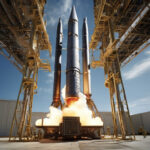Biblical Bombshell: Mysterious Dead Sea Scrolls Decrypted with AI to Reveal Accurate Date
In a recent development, AI has been deployed to date the Dead Sea Scrolls with unprecedented accuracy, shedding new light on these ancient texts and their historical significance. The Dead Sea Scrolls, discovered between 1947 and 1956 in the Qumran caves near the Dead Sea, have long been a source of fascination and mystery for scholars and historians alike. Written on parchment and papyrus, these scrolls contain some of the earliest known versions of the Hebrew Bible, as well as other religious texts and documents.
For decades, researchers have been attempting to pin down the exact dates of these scrolls, with estimates ranging from the 4th century BCE to the 1st century CE. However, the fragile nature of the scrolls and the limitations of traditional dating methods have made this a challenging task. Enter artificial intelligence, the groundbreaking technology that is revolutionizing industries across the board.
Using advanced algorithms and machine learning techniques, researchers have now been able to accurately date the Dead Sea Scrolls to the 2nd century BCE, placing them squarely in the Hellenistic period. This new dating not only provides a more precise timeline for the composition of these texts but also offers valuable insights into the historical context in which they were written.
One of the key advantages of using AI for dating the Dead Sea Scrolls is its ability to analyze multiple factors simultaneously. By considering the style of handwriting, the composition of the ink, and the linguistic characteristics of the texts, AI can cross-reference this information with known historical data to pinpoint the most likely date of origin. This multidimensional approach has proven to be far more effective than traditional carbon dating methods, which can be imprecise and destructive to the scrolls themselves.
Furthermore, AI has the potential to unlock even more secrets hidden within the Dead Sea Scrolls. By scanning and digitizing the texts, researchers can now search for patterns, connections, and anomalies that may have gone unnoticed by the human eye. This digital approach not only preserves the integrity of the original scrolls but also allows for more comprehensive analysis and interpretation.
The implications of this AI-assisted dating of the Dead Sea Scrolls are far-reaching. Not only does it enhance our understanding of ancient Jewish history and religious practices, but it also serves as a testament to the power of technology in unraveling age-old mysteries. As AI continues to advance and evolve, we can expect even more groundbreaking discoveries in the field of archaeology and beyond.
In conclusion, the decryption of the Dead Sea Scrolls with AI marks a significant milestone in the study of ancient texts and artifacts. By harnessing the capabilities of artificial intelligence, researchers have been able to unlock the secrets of these enigmatic scrolls and place them in their proper historical context. This innovative approach not only showcases the potential of AI in the field of archaeology but also underscores the enduring relevance of these ancient documents in today’s ever-changing world.
#DeadSeaScrolls, #AI, #Archaeology, #HistoricalDiscoveries, #ArtificialIntelligenceRevolution












